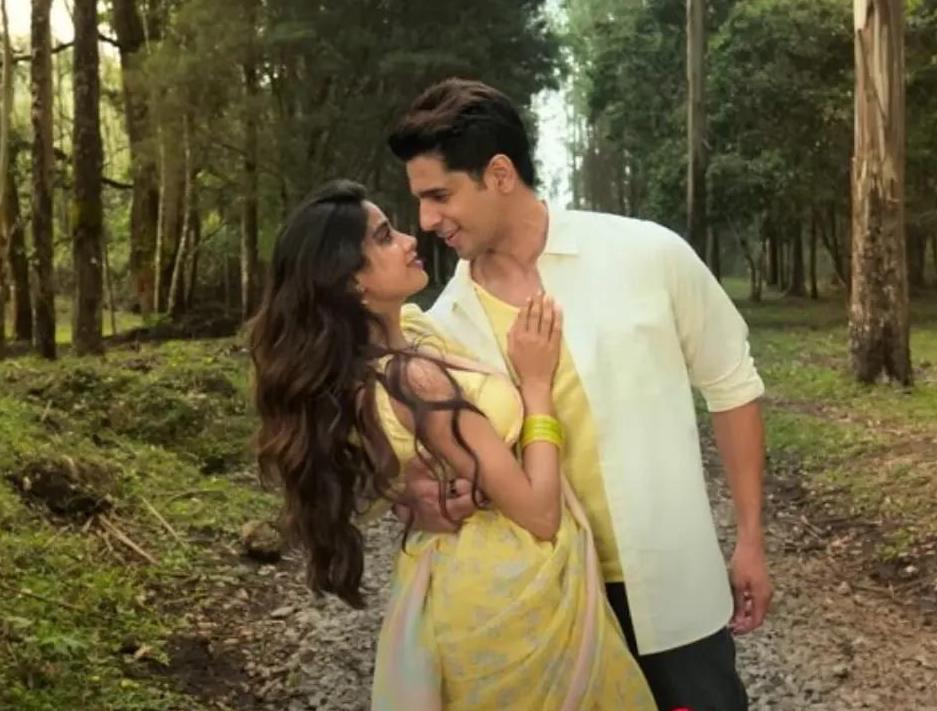Tushar Jalota’s Param Sundari aims to position itself as a romantic comedy with a pointed assertion that the choice of a soulmate is determined less by algorithms and more by the organic rhythms that emerge between two people. Though novel in thought, the film succumbs to an overabundance of ideas and a restless tonal register. The result is a work whose scattershot energy leaves its central message curiously muddled, and its charm badly diluted by excess.
Param (Sidharth Malhotra), a spoiled heir who has failed at multiple start-ups, begs his father for one last chance and places his faith in Soulmates, an app that claims to find one’s perfect match through advanced algorithms. The app leads him to Sundari, a homestay owner in Cochin, whose lifestyle and values are very different from his own. With his loyal friend, Juggy (Manjot Singh), by his side, Param sets out to win her heart and save his drawing career…
Param Sundari suffers from a half-baked screenplay, which is just the beginning of all its problems. Param’s journey to Kerala is driven by a need to prove the app’s credibility and, by extension, to justify his next business venture. Yet the film never instils a genuine sense of desperation, as there is little indication that failure would cost him everything. As a result, the audience is left with minimal reason to empathize with him and his pursuit. This lack of dramatic build-up becomes the film’s defining flaw; scenes arrive too quickly, resolve too abruptly, and rarely linger long enough. The film’s manic pace demands constant recalibration from the viewer, while the emotional core, so crucial to romantic comedy, remains frustratingly underdeveloped. Even the lighter moments, meant to provide charm, feel rushed and under-scripted. What results is a film that wants to be heartfelt, but unfortunately, never earns its emotional payoffs.
The Kerala setting is clearly chosen to highlight a cultural contrast between a Delhi-based Punjabi boy and a woman rooted in Kerala. But instead of exploring cultural differences through character dynamics, the film leans on tourist-brochure imagery, such as Onam festivities, Kalaripayattu demonstrations, elephant processions, backwaters and waterfalls, and a sequence inside a church, characters drinking toddy, as if ticking the right boxes rather than working on the narrative. Sundari’s introduction hints at richer possibilities, initially. She is shown teaching Mohiniattam to young girls, positioning her as a professional artist with cultural depth. Sadly, this aspect, too, is barely revisited, with her subsequent performances reduced to decorative interludes rather than integral character moments. Even the climactic snake boat race, a sequence clearly telegraphed for victory, suffers from the same lack of dramatic investment. The outcome feels fleeting, like a foregone conclusion in a film that does not attempt to surprise or subvert expectations.
The Malayali characters occasionally speak in their native language, with Hindi subtitles provided for convenience. At other times, they switch abruptly to Hindi without any clear motivation. This inconsistency undercuts the authenticity of the setting and makes the cultural texture feel compromised, as if the film cannot decide between realism and accessibility. There is also a seductive nurse character whose presence is intended to provide comic relief. However, the portrayal feels less humorous and more awkwardly suggestive.
Sidharth Malhotra’s performance is hampered by a limited range of gestures and expressions. And while Janhvi Kapoor makes a sincere attempt to embody a Malayali woman, her portrayal seems put-on and lacks conviction. Crucially, Malhotra and Kapoor fail to generate the necessary chemistry, leaving the central romance inert. Sanjay Kapoor, appearing briefly at the start and again near the end, registers more as a narrative device than as a fully realised presence. Manjot Singh plays the loyal sidekick with easy charm, though the role offers little depth. Renji Panicker and Siddhartha Shankar contribute minimally to the drama, as their arcs are left badly underdeveloped.
Santhana Krishnan Ravichandran’s cinematography captures Kerala’s natural beauty with postcard precision but fails to emotionally resonate. Manish Pradhan’s editing maintains a certain rhythm, yet cannot compensate for the screenplay’s lack of dramatic coherence. The songs, pleasant enough on their own, feel more like ornamental additions rather than narrative necessities. An overbearing background score by Sachin-Jigar frequently overshadows Dhiman Karmakar’s sound design. Filmmakers must understand that slow motion and rousing background scores only work when the protagonist exudes genuine swagger, something sorely missing here. Param’s introduction, framed around his workout, plays more like a thirst trap than a character-defining moment. And as the film progresses, the underwritten scenes by Jalota and Aarsh Vora leave the actors with little to play with, forcing the background score to overcompensate. The result is a film that tries to create energy through style rather than substance. But when style fails to elevate the material, the emptiness becomes all the more glaring.
Param Sundari relies on a well-worn formula and is a potent reminder yet again that familiar tropes demand reinvention to make an impact. It is high time the Hindi film sought fresher ideas, embellished with sharper writing and deeper emotional stakes.
Hindi, Malayalam, Romantic Comedy, Drama, Color


